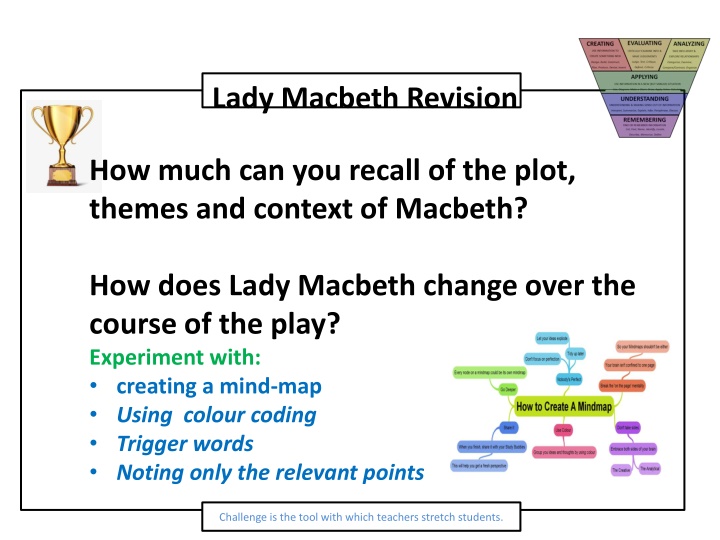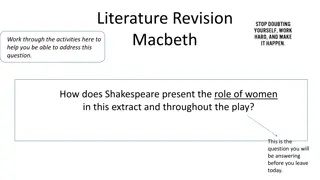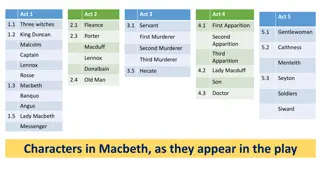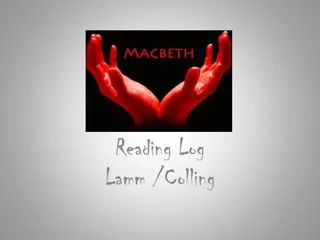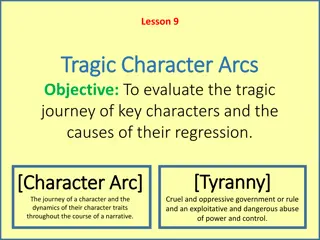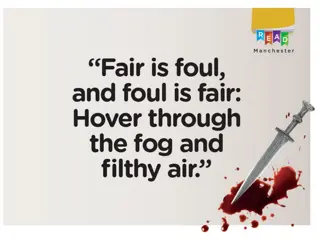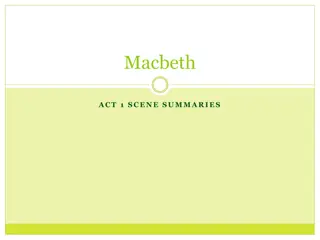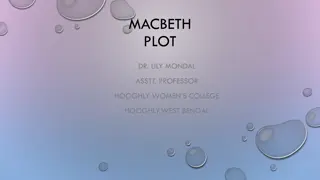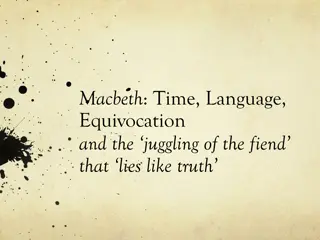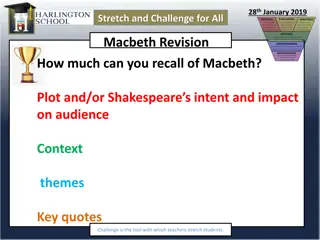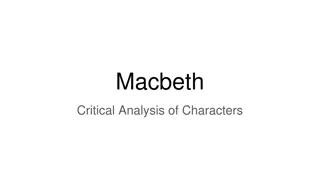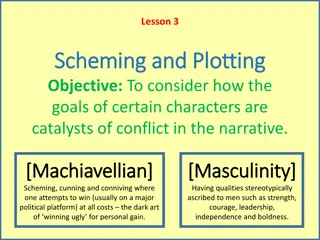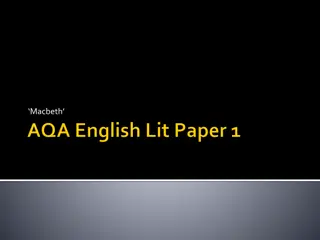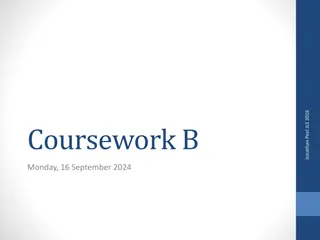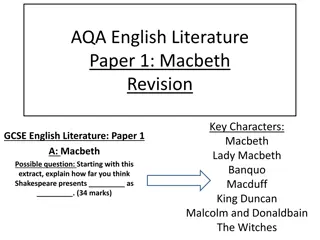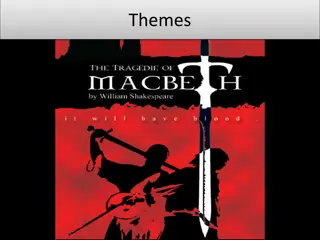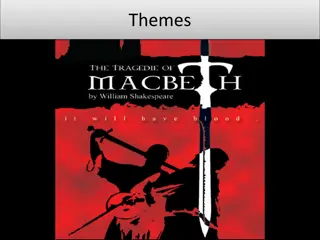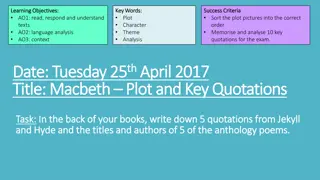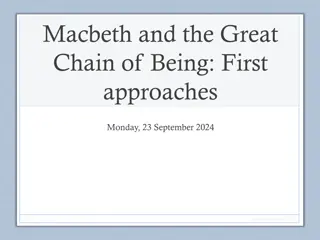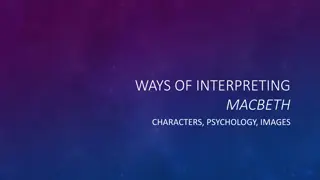Lady Macbeth - Key Themes, Plot, and Context Exploration
This content delves into the plot, themes, and context of Macbeth while focusing on Lady Macbeth's transformation throughout the play. It includes key elements such as the supernatural, the role of women, and the impact of witchcraft beliefs in Shakespeare's era.
Download Presentation

Please find below an Image/Link to download the presentation.
The content on the website is provided AS IS for your information and personal use only. It may not be sold, licensed, or shared on other websites without obtaining consent from the author.If you encounter any issues during the download, it is possible that the publisher has removed the file from their server.
You are allowed to download the files provided on this website for personal or commercial use, subject to the condition that they are used lawfully. All files are the property of their respective owners.
The content on the website is provided AS IS for your information and personal use only. It may not be sold, licensed, or shared on other websites without obtaining consent from the author.
E N D
Presentation Transcript
Lady Macbeth Revision How much can you recall of the plot, themes and context of Macbeth? How does Lady Macbeth change over the course of the play? Experiment with: creating a mind-map Using colour coding Trigger words Noting only the relevant points Challenge is the tool with which teachers stretch students.
21st November 2018 Learning Objective: To understand the key ideas, events and characters of Macbeth . All will be able to explain how the supernatural impacts the characters. AO1 Most will be able to select a range of quotations/language devices to support their response. AO2 Some will be able to use contextual knowledge to analyse how the supernatural is used as a key theme in the play. AO3 Main themes of the play: Keywords: Appearance Vs Reality Divine Right of Kings Murder Blood Loss of sleep The Supernatural The role of women Context Supernatural Oxymoron Pathetic fallacy This is a play full of dark and evil deeds. Even the performance of the play is riddled with superstitions; actors/actresses have broken limbs, the repetition of the name Macbeth three times is said to bring bad luck, some believe that the witches spells have actually come true and cursed production crews and that Banquo s ghost/the witches often appear on stage for real.
GCSE English Literature - Paper 1: Shakespeare and the 19th Century Novel Section A Macbeth AO1: Clear explained response to task and Macbeth text. Effective use of references from the play to support explanation. Clear writing and well selected quotations AO2: Clear explanation of Shakespeare s methods/techniques. Understanding of effects of Shakespeare s methods/techniques on the audience. Do you understand how dramatic irony/stage directions/Soliloquy/Asides are used? AO3: Clear understanding of ideas/perspectives/contextual factors shown by specific links between Jacobean era/Macbeth text and the task. Context of the play AO4: Learners spell and punctuate with consistent accuracy, and consistently use vocabulary and sentence structures to achieve control of meaning. SPaG
Elements of the Supernatural that are presented in Macbeth: 1. The three Witches - Act 1 Scene 1, Act 1 Scene 3, Act 3 Scene 5, Act 4 Scene 1. 2. Dagger hallucination Act 2 Scene 1 3. Banquo s Ghost Act 3 Scene 4 4. Images of Hell Act 2 Scene 3 (Porter s speech) 5. The Apparitions Act 4 Scene 1 6. Madness Act 2 Scene 1, Act 3 Scene 4, Act 5 Scene 1 Shakespeare included these elements in the play to give it a sense of drama and excitement.
Some will be able to use contextual knowledge to analyse how the supernatural is used as a key theme in the play. AO3 Beliefs in witchcraft and the supernatural were common in Shakespeare s era, particularly as the King (James 1st) himself believed in them. In 1604, witchcraft became a capital offence. Evidence of a relationship with evil spirits/witches condemned a suspect to death by hanging, burning or drowning. Whether Shakespeare himself believed in witches does not matter; he used them for his play, and many of his audience would have believed in them as thoroughly evil servants of the devil. For the people of Shakespeare s time, the devil was very real who they believed spent his time trying to tempt people into his power. Note that very early in the play Banquo realises this and says this to Macbeth What, can the devil speak true? It was believed that witches could see into the future; that they could create storms, hail, thunder and lightning; that they were able to sink ships; dry up springs; stop the sun and change night into day and day into night. They could also cause the death of their enemies, and could make themselves invisible. In order to work their charms they would open graves and steal parts of the bodies to make potions. For this purpose the bodies of unbaptised babies were especially prized. However, they do allow him to deceive himself. Macbeth is easily captured by the witches power and by their prophecies. But note that they never tell him a lie. For a king like Macbeth to visit and have dealings with witches would have been both a crime and a sin.
SCENE I. A deserted place. Thunder and lightning. Enter three Witches Stage directions Pathetic Fallacy creates a dark and sinister atmosphere from the outset. First Witch When shall we three meet again? In thunder, lightning, or in rain? The witches start the play instead of the title character. This is done by Shakespeare for a number of reasons: Dramatic, especially when performed. Frightening, particularly in Shakespeare s era. Shows they will have a huge impact on the course of events. Creates a sense of mystery - Shows that they have an evil plan to destroy Macbeth. Second Witch When the hurlyburly's done, When the battle's lost and won. Third Witch That will be ere the set of sun. First Witch Where the place? Second Witch Upon the heath. Third Witch There to meet with Macbeth. First Witch I come, Graymalkin! Use of rhyming couplets shows that they are creating a spell and that they are unnatural beings, especially because of their supposed dominance over nature. Second Witch Paddock calls. Third Witch Anon. ALL Fair is foul, and foul is fair: Hover through the fog and filthy air. Use of the Oxymoron in fair and foul Shows that things will not be as they appear Appearance Vs Reality (Key theme) Exeunt
Act 2 Scene 1 Dagger hallucination Macbeth s second soliloquy in the play. Is this a dagger which I see before me, The handle toward my hand? Come, let me clutch thee. I have thee not, and yet I see thee still. Art thou not, fatal vision, sensible To feeling as to sight? Or art thou but A dagger of the mind, a false creation, Proceeding from the heat-oppress d brain? I see thee yet, in form as palpable As this which now I draw. Thou marshall st me the way that I was going, And such an instrument I was to use. Mine eyes are made the fools o' th' other senses, Or else worth all the rest. I see thee still, And on thy blade and dudgeon gouts of blood, Which was not so before. There s no such thing. It is the bloody business which informs Thus to mine eyes. Now o'er the one half-world Nature seems dead, and wicked dreams abuse The curtained sleep. Witchcraft celebrates Pale Hecate s offerings, and withered murder, Alarumed by his sentinel, the wolf, Whose howl s his watch, thus with his stealthy pace, With Tarquin s ravishing strides, towards his design Moves like a ghost. Thou sure and firm-set earth, Hear not my steps, which way they walk, for fear Thy very stones prate of my whereabout, And take the present horror from the time, Which now suits with it. Whiles I threat, he lives. Words to the heat of deeds too cold breath gives. Confused about whether the dagger is real or a figment of his imagination. Calls it a fatal vision arising from a heat oppressed brain which shows that he is stressed about committing this deed. Feels that his senses/mind are playing tricks on him, especially when the dagger reappears with blood on it it leads him to Duncan s chamber. Macbeth refers to negative imagery of darkness, nightmares, witchcraft, ghosts and wolves, shows how the evil of the witches and his own dark thoughts have consumed him. Asks the earth to remain silent so that his footsteps cannot be heard whilst he commits this evil deed. Says that the more he thinks about the deed, the weaker he becomes so he needs to go ahead with it quickly.
Act 3 Scene 4 - The GHOST OF BANQUO enters, and sits in MACBETH's place ROSSE - Please't your highness to grace us with your royal company. MACBETH - The table's full. LENNOX - Here is a place reserved, sir. MACBETH - Where? LENNOX - Here, my good lord. What is't that moves your highness? MACBETH - Which of you have done this? LORDS - What, my good lord? MACBETH - Thou canst not say I did it: never shake thy gory locks at me. ROSSE - Gentlemen, rise: his highness is not well. LADY MACBETH - Sit, worthy friends: my lord is often thus, And hath been from his youth: pray you, keep seat; The fit is momentary; upon a thought He will again be well: if much you note him, You shall offend him and extend his passion: Feed, and regard him not. Are you a man? MACBETH - Ay, and a bold one, that dare look on that which might appal the devil.
Most will be able to select a range of quotations/language devices to support their response. AO2 Who said these quotations and what is their significance? 1. Fair is foul and foul is fair 2. (Aside) My thought, whose murder yet is but fantastical, shakes so my single state of man. 3. You should be women, And yet your beards forbid me to interpret that you are so. 4. That look not like th' inhabitants o' th' Earth and yet are on 't? Live you? Or are you aught That man may question? - 5. Come, you spirits that tend on mortal thoughts, unsex me here, and fill me from the crown to the toe top-full of direst cruelty. - 6. There s husbandry in heaven; Their candles are all out. - 7. Is this a dagger I see before me? The handle toward my hand? Come, let me clutch thee 8. The time has been that, when the brains were out, the man would die, and there an end. But now they rise again with twenty mortal murders on their crowns and push us from our stools. 9. Thou canst not say I did it: never shake thy gory locks at me! 10. Be bloody, bold and resolute, laugh to scorn the power of man, for none of woman born shall harm Macbeth. -
Most will be able to select a range of quotations/language devices to support their response. AO2 Who said these quotations and what is their significance? 1. Fair is foul and foul is fair Witches, Act 1 scene 1. The oxymoron of fair and foul in the first scene shows that things will not be as they appear throughout the play. Theme Appearance Vs Reality. 2. (Aside) My thought, whose murder yet is but fantastical, shakes so my single state of man. Macbeth, Act 1 Scene 3. The witches have planted a seed of darkness in Macbeth s mind and his own thoughts of murdering the King are scaring him. They simply voice what he is thinking. 3. You should be women, And yet your beards forbid me to interpret that you are so. Banquo, Act 1 Scene 3. Banquo questions the unnatural appearance of these strange women. They appear to be women with beards so their gender is ambiguous. Links to the idea that males have more power in society, even Lady Macbeth asks for masculine qualities to become more powerful (Act 1 Scene 5). 4. That look not like th' inhabitants o' th' Earth and yet are on 't? Live you? Or are you aught That man may question? Banquo, Act 1 Scene 3. Again, they look unnatural and it indicates that they will help in breaking the natural order. He is not afraid to challenge them and the things they say, unlike Macbeth who is fully tempted by their words. 5. Come, you spirits that tend on mortal thoughts, unsex me here, and fill me from the crown to the toe top-full of direst cruelty. - Theorists have said that despite the fact that Lady Macbeth has never met the witches, she is also absorbed by their words after reading Macbeth s letter about the prophecies. She is often referred to as the fourth witch in the play as she drives Macbeth s dark thoughts and ambition into reality.
6. Theres husbandry in heaven; Their candles are all out. Banquo, Act 2 Scene 1. Banquo cannot sleep and has been dreaming of the witches. As he walks around Macbeth s castle on the night of the murder, he comments on the fact that the skies do not appear to be normal, the stars aren t shining and there seems to be disorder in heaven his sense of foreboding foreshadows what happens. 7. Is this a dagger I see before me? The handle toward my hand? Come, let me clutch thee Macbeth, Act 2 Scene 1. Macbeth s hallucination of the dagger shows his distressed state as a result of what he is about to do (kill the King). The dagger vision is symbolic of the fact that he will be restless and haunted for the rest of his life as a result of the murder. This soliloquy shows how the dagger leads him to Duncan s chamber, thus showing that his mind is full of evil and darkness. 8. The time has been that, when the brains were out, the man would die, and there an end. But now they rise again with twenty mortal murders on their crowns and push us from our stools. Macbeth, Act 3 Scene 4. Macbeth sees Banquo s ghost sitting in his seat at his coronation banquet. He talks about how it used to be that when you knocked a man s brains out he would just die, and that would be it. But now they rise from the dead with twenty fatal head wounds and push us off our stools. 9. Thou canst not say I did it: never shake thy gory locks at me! Macbeth, Act 3 Scene 4. Macbeth behaves suspiciously in front of his guests, telling Banquo s ghost not to shake his blood covered hair at him. The ghost is symbolic of Macbeth s guilt. 10. Be bloody, bold and resolute, laugh to scorn the power of man, for none of woman born shall harm Macbeth. Second apparition, Act 4 Scene 1. Macbeth is deceived by the apparitions, he is led to believe that he is invincible he doesn t consider that Macduff was born via Caesarean.
All will be able to explain how the witches are presented by Shakespeare. AO1 Most will be able to select a range of quotations/language devices to support their response. AO2 Some will be able to use contextual knowledge to analyse the impact of the witches. AO3 Idea of Macbeth being a tragic hero how do they influence him? Links to context? What do they do in the play itself that relates to commonly held beliefs in the Jacobean era? Weird Sisters original meaning? Theme - Appearance versus Reality Question: How do the witches influence the events of the play Macbeth ? Influence on other characters? Why do they start the play? Why not the title character? Key How are they linked to Macbeth s destiny? Quotations? How would a Shakespearean audience react to the witches? Use of rhyming couplets? Pathetic Fallacy? Foreshadowing? Dramatic Irony?
Look at the following quotations and answer the following questions: What can you write about its meaning? The language/dramatic devices used? Effect on the audience? Context of the play? Connotations of any of the words? Link to any of the other Key themes? Prompts Basic Implies... Suggests... Demonstrates... connotes... Highlights... infers... More than a basic - Better This also... Another... In addition... Furthermore... Taking this further... Perhaps... Maybe... Further analysis - Best The author might be... Elsewhere in the text This links to the idea This supports the point Macbeth Act 1 Scenes 1 and 3 Fair is foul and foul is fair. All hail Macbeth, hail to thee that shalt be King hereafter! If you can look into the seeds of time and say which seeds will grow and which will not, speak, then to me who neither beg nor fear your favours or your hate. Most will be able to select a range of quotations/language devices to support their response. AO2
Effect on audience: Shakespeare s era Fearful of the witches power and Banquo s challenge. Key theme Supernatural AO3 Context: Reference to beliefs about witches; they could predict the future. Connotations Banquo does not fear them and tests the validity of their words. If you can look into the seeds of time and say which seeds will grow and which will not, speak, then to me who neither beg nor fear your favours or your hate. AO2 Seeds are a metaphor for the passage of time and for having children. Banquo challenges the witches to give him prophecies too. Also foreshadows that fact that Banquo s seeds will be future Kings. Meaning Banquo diverts attention away from Macbeth; he is suspicious of the witches, especially when he sees how Macbeth seems to be consumed by their words. He even associates them to the devil tempting Macbeth with their prophecies.
General points to note about the Supernatural in Macbeth: The witches are unnatural, supernatural beings. Banquo calls them instruments of darkness suggesting their devilish qualities and the fact that the things that they say are not as they seem. They are evil, their prophecies in Act 1 Scene 3 tempt Macbeth to actually kill the rightful King; the witches predictions of greatness are true BUT they don t tell Macbeth about the price he will have to pay. Nature gets upset by evil deeds - Act 2 Scene 4. The witches plant the seed of darkness in Macbeth s mind and as a result of breaking the Divine Right of Kings, the natural order is also broken. The witches use of spells and the ingredients that they use would have been considered both frightening and disgusting finger of birth-strangled babe, ditch delivered by a drab The spells that they cast show an inherent sense of evil and malevolence that is other worldly and devilish. Use of rhyming couplets, spells and short sentences make the witches sound unnatural and sinister. In Act 4 Scene 1, the witches show Macbeth the apparitions and lead him into a false sense of security; they deliberately show him visions that they know he will misinterpret. Macbeth and Lady Macbeth both express disturbances in their mind when they talk of seeing the visions of blood on their hands. In this play, blood is symbolic of guilt and actually leads Lady Macbeth to committing suicide when she cannot mentally wash the blood from her hands out damned spot .
Act 3 Scene 4 Banquo s ghost. Nobody sees the ghost apart from Macbeth. The ghost is a symbol of his guilt and the bloody course that Macbeth has chosen. It is ironic that the ghost is sitting in his seat as Banquo s descendants will become King and this further heightens the drama of the scene. The ghost also unnerves Macbeth to the extent that he looks like a weak King in front of his royal guests (they start to become suspicious of him). Lady Macbeth as the fourth witch Act 1 Scene 5 is seen by theorists as evidence of Lady Macbeth being a witchlike and Gothic character, especially as her soliloquy talks of ravens, death, darkness, spirits, subverting the natural order (e.g. take my milk for gall ) and power. Madness Act 2 Scene 1 (dagger hallucination), Act 3 Scene 4 (Banquo s ghost) and Act 5 Scene 1 (Lady Macbeth sleepwalking) are all scenes which depict the madness of the Macbeths as a result of the supernatural. Whenever the supernatural is used as a theme, a deed of evil is committed.
